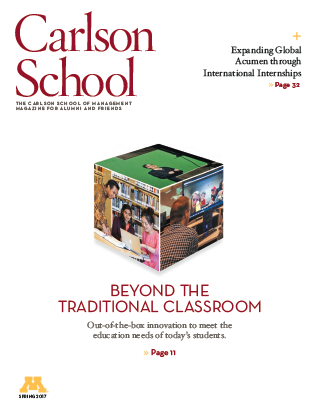
Beyond the Traditional Classroom: Experiential Learning
Wednesday, July 12, 2017
The Enterprise programs have had a long and successful tenure at the Carlson School. These programs assemble MBA and select undergraduate students into small teams to tackle real challenges for real companies. Associate Dean Raj Singh hopes to replicate their success at the undergraduate level through “In Action” courses.
“When I walked into this job, our school was pushing experiential learning a lot,” he says. “We had a hard time replicating that experience for our large undergraduate program. When we do it in MBA, it’s high-touch and very expensive. So, we wanted to give students experiential learning in a way that could touch a big fraction of our 700 students who graduate every year. My goal is to reach at least two-thirds of them each year.”
There are five In Action courses so far: three new ones are Finance, Marketing, and Management Accounting. Finance In Action and Marketing In Action began last fall with Management Accounting In Action to be rolled out next year. In the finance course, students learn how to build financial models by studying real-world organizations. Then, they develop a live financial analysis and a risk/reward investment recommendation to present to a real client organization. In marketing, the students create recommendations for real-life marketing problems by analyzing business models, sizing new markets, drafting a brand promotion plan, and pricing a product. The courses take their cue—and their name—from the school’s successful Entrepreneurship In Action course run out of the Holmes Center. In the last 11 years, this course has launched 25 businesses and generated more than $400,000 in revenue. There is also an MIS course that has been taught under different names for many years. Last fall, it was rechristened MIS In Action. In this course, companies provide students with an IT challenge. The students then work in groups to propose solutions to present to senior company executives. Singh is hopeful the new In Action courses will be as successful as these existing ones.
"All the skills—team building, working on a long-term project, using skills from different areas—these are skills that leaders need.”
“My view is that when we teach academic knowledge, it sometimes doesn’t penetrate,” he says. “It’s useful information, but until you internalize it and until you really live and breathe it, you don’t get it. These courses, I’m hoping, will help students internalize knowledge much better. All the skills—team building, working on a long-term project, using skills from different areas—these are skills that leaders need.”
Like the Enterprises, the In Action courses will acquire outside projects from companies and corporations. “We have students divide up into teams, and all teams work on the same project,” he says. “The difference from the Enterprises is the scope of these projects is smaller and instead of having one team on one project, we can have five to seven teams work on one project. So it’s like a competition. Whoever comes up with the best solutions gets graded accordingly.”
Another difference is that In Action courses won’t charge their client companies. “We’re hoping that we develop the projects and they’ll support us in various ways,” Singh says, adding that companies already have an affinity for Carlson School students. “The reason they love our students is because when our students are working outside the companies, they don’t have group think. They are independent. They come up with ideas that are wonderful because they come from outside.”
Right now, Singh says there are no plans to make the In Action course required, and he likes it that way. “My own intention is to stay away from requirements and make classes that students want to take,” he says.
Experiential on a Global Scale
The Carlson Global Institute’s Global Business Practicum provides experiential learning cross-culturally. Students work with partner schools overseas on issues facing real businesses. It’s a good deal for both parties as the students gain invaluable experience with international business and the companies receive important feedback to their global challenges.
Hormel Foods is one company that has found value in the program—it has participated on three separate occasions so far. “The first was about developing processed meat snacks in China,” says Tim Barinka, Vice President of Hormel Foods International. “The marketing involved the U of M team and its partner university in China. We had an intro kick-off session describing the goals and core of the project to students here and then fed to their partner students in China. The project also included a visit to China where they met with their counterparts and some of our management team.”
The second project was looking at an entry into the Russian market, which included partner students from the Vienna University of Economics and Business. The most recent project was in Brazil with partner school Fundação Getulio Vargas and dealt with Muscle Milk. “They did a feasibility study with the brand and product line and studied the category and consumer segments to see if it was attractive for Hormel Foods,” Barinka says.
Although the projects had different products and goals, the common denominator was having a team comprised of many functions, such as marketing, accounting, and supply chain. “It’s a good functional mix of students. That is one of the benefits from our standpoint,” Barinka says. “Not only the local U of M team, but its counterpart in the foreign market. There’s a good mix of eyes looking at the project. They have a cross-functional expertise they can bring to it.”
What’s the value for the student? Barinka says you can sit in a class and look at case studies from a textbook, but that can sometimes be pretty static. “Interacting with a company is live and vibrant from a student’s perspective,” he says. “The interaction with a live case and company just brings higher interest and more real-time value to the project.”
Also students get valuable experience in working within groups and building interpersonal relationships. “When we hire students, those are the kind of skills we look for in leadership,” Barinka says. “We look at communication skills, we look at decision-making, and we look at strategic thinking.”
Barinka says a testimonial to the whole Global Business Practicum program is that Hormel Foods has done three of them. “That’s a sign of success, that we’ve been happy with the work and the collaboration,” he says. “It’s giving back to the U of M, but it’s also getting something in return.”

